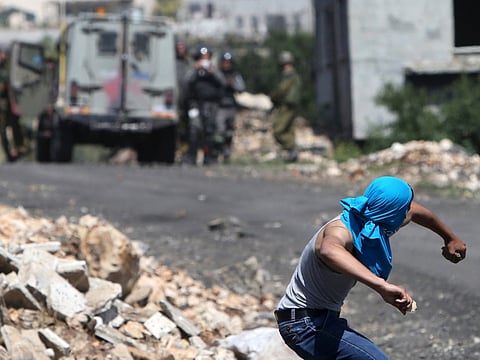Of three uprisings and Israeli testimonies
Angry Palestinian individuals seem determined to confront the aggression on their own by all means possible

The ongoing tide of inhuman practices by the Israeli government and army against Palestinians in the West Bank triggered a lot of talk among Israeli analysts, politicians and generals pointing to the increasing possibilities of a third Palestinian Intifada.
The first and the second Intifadas, especially the one that erupted from Al Aqsa Mosque, were ignited by popular outrage because of a specific incident that enraged Palestinians in the Occupied Territories.
Today, many well-established Israeli personalities point to a third Palestinian Intifada that has been going on since March 2014 as a result of a continuous Israeli aggression focusing on Al Aqsa Mosque, the third holy site of Islam.
Now, not only is the Palestinian population outraged, but it seems determined to confront the aggression on their own by all possible means. Israeli commentators are calling it “intifada of the Individuals”, recalling one incident earlier this year, when a Palestinian Jerusalemite (Hamza Ma’touk) stabbed 16 Israelis riding a bus in Tel Aviv.
Israeli military commentator Ron Ben Yishai wrote in Yediot Ahronot saying, “whoever did not realise it already (the Israeli police commissioner, for example), [should know that] this is definitely the third Intifada. But unlike the nightmare scenarios we imagined, based on past experience, numerous Palestinians are not participating as they did in the first Intifada, nor is it characterised by frequent and catastrophic terror attacks like the second Intifada. It has indeed been going on since the breakdown of direct negotiations by Secretary of State John Kerry, but it has not been given the moniker of intifada by the majority, because it is usually carried out on a low heat”. On the same note, Jacob Amidror wrote under ‘Three Challenges Facing Israel’ that “so far, there is no simple answer by which Israel could face and stop the peril stemming from unorganised terrorist acts carried out by individuals on their own. Intelligence agencies in this case cannot collect any useful intelligence that reveals the hidden intention of an individual before he commits his terrorist act.
Therefore, stopping such acts of individuals not connected to a particular organisation providing help and encouragement makes it impossible to stop them before they take place”.
Along these lines, the Israeli commentator Yosi Melman wrote that “there is no doubt, whatsoever, that Israel is standing at the very edge of a bottomless pit of an active volcano, spewing heavy smoke and lava, which cannot be stopped because, according to Shabak (Israeli intelligence), the indications rule out the participation of any particular organisation behind these terrorist acts carried out by individuals”.
He added: “The other previous Intifadas were not organised and controlled by any central command, but were as a result of popular uprisings, which compelled heads of Palestinian organisations to jump and ride their moving train. Now individuals are planning and executing terrorist acts on their own.”
In reality, this third Intifada expresses the extreme anger and frustration of individual Palestinians who no longer can take the brutal force of the Israeli military occupation and have no patience left to wait for various Palestinian organisations to stop the steady Judaisation of all historical Palestine. Secondly, Israel cannot retaliate against organisations that have absolutely nothing to do with such acts carried by individuals on their own, spreading resistance in various parts of Israel as well as parts of the occupied Palestinian West Bank, especially in occupied East Jerusalem.
These “lone Palestinian individuals” have taken upon themselves to confront the Israeli killing machine by all means possible, thereby denying Israel the security denied to the Palestinians. In this light, David Hearst, editor of the online Middle East Eye, wrote that “what distinguishes this Palestinian intifada from the other two is that it is being waged by Palestinians living within the wall erected by Israel surrounding itself, thus making the Palestinians of East Jerusalem and the Palestinians of [19]48, who are Israeli citizens, the actual combatants in this battle.
This Intifada is unlike the previous two that were waged outside the secured borders of the Israeli state”. He said: “Netanyahu was correct, this time, when he declared that this is the battle for Jerusalem being waged by Palestinians before the Israeli settlers completely take over East Jerusalem, or it could be the battle in which, Jerusalem becomes the central issue attracting fighters from all over the world — Sunnis, Shiites, Islamic Jihadists, secular nationalist and ‘Takfiri’ fighters.”
Are we now on the verge of a devastating ‘religious war’? Most specialists well-versed in Middle East affairs are absolutely certain that this ‘religious war’ has already started since Likud and its ultra-religious and ultra-nationalist allies came to power in Israel. And this ‘religious war’ is on the verge of getting out of control since the toxic waste of Al Qaida and Daesh (the self-proclaimed Islamic State of Iraq and the Levant) has now reached a number of Arab countries.
This ‘war’ is being fuelled by Israeli occupation, in which, the extreme religious and ultra-nationalist Jewish right-wing is calling the shots. This is why the Palestinian President, Mahmoud Abbas, along with others, have warned that if the Israeli occupation persists with impunity, then — sadly — a religious war would erupt. Consequently, international security and the very stability of western countries will also be at stake.
Professor As’ad Abdul Rahman is the chairman of the Palestinian Encyclopaedia.


